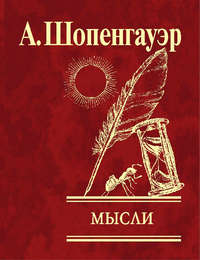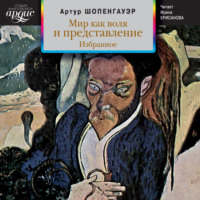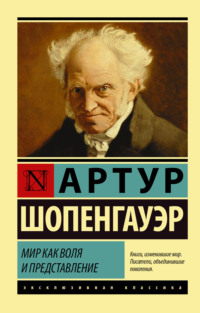 полная версия
полная версияThe World as Will and Idea (Vol. 3 of 3)
That moral investigations are incomparably more difficult than physical, and in general than any others, results from the fact that they are almost immediately concerned with the thing in itself, namely, with that manifestation of it in which, directly discovered by the light of knowledge, it reveals its nature as will. Physical truths, on the other hand, remain entirely in the province of the idea, i. e., of the phenomenon, and merely show how the lowest manifestations of the will present themselves in the idea in conformity to law. Further, the consideration of the world from the physical side, however far and successfully it may be pursued, is in its results without any consolation for us: on the moral side alone is consolation to be found; for here the depths of our own inner nature disclose themselves to the consideration.
But my philosophy is the only one which confers upon ethics its complete and whole rights; for only if the true nature of man is his own will, and consequently he is, in the strictest sense, his own work, are his deeds really entirely his and to be ascribed to him. On the other hand, whenever he has another origin, or is the work of a being different from himself, all his guilt falls back upon this origin, or originator. For operari sequitur esse.
To connect the force which produces the phenomenon of the world, and consequently determines its nature, with the morality of the disposition or character, and thus to establish a moral order of the world as the foundation of the physical, – this has been since Socrates the problem of philosophy. Theism solved it in a childish manner, which could not satisfy mature humanity. Therefore pantheism opposed itself to it whenever it ventured to do so, and showed that nature bears in itself the power by virtue of which it appears. With this, however, ethics had necessarily to be given up. Spinoza, indeed, attempts here and there to preserve it by means of sophistry, but for the most part gives it up altogether, and, with a boldness which excites astonishment and repugnance, explains the distinction between right and wrong, and in general between good and evil, as merely conventional, thus in itself empty (for example, Eth. iv., prop. 37, schol. 2). After having met with unmerited neglect for more than a hundred years, Spinoza has, in general, become too much esteemed in this century through the reaction caused by the swing of the pendulum of opinion. All pantheism must ultimately be overthrown by the inevitable demands of ethics, and then by the evil and suffering of the world. If the world is a theophany, then all that man, or even the brute, does is equally divine and excellent; nothing can be censurable, and nothing more praiseworthy than the rest: thus there is no ethics. Hence, in consequence of the revived Spinozism of our own day, thus of pantheism, the treatment of ethics has sunk so low and become so shallow that it has been made a mere instruction as to the proper life of a citizen and a member of a family, in which the ultimate end of human existence is supposed to consist: thus in methodical, complete, smug, and comfortable philistinism. Pantheism, indeed, has only led to such shallow vulgarisms through the fact that (by a shameful misuse of the e quovis ligno fit Mercurius) a common mind, Hegel, has, by the well-known means, been falsely stamped as a great philosopher, and a herd of his disciples, at first suborned, afterwards only stupid, received his weighty words. Such outrages on the human mind do not remain unpunished: the seed has sprouted. In the same spirit it was then asserted that ethics should have for its material not the conduct of individuals, but that of nations, that this alone was a theme worthy of it. Nothing can be more perverse than this view, which rests on the most vulgar realism. For in every individual appears the whole undivided will to live, the thing in itself, and the microcosm is like the macrocosm. The masses have no more content than each individual. Ethics is concerned not with actions and their results, but with willing, and willing itself takes place only in the individual. Not the fate of nations, which exists only in the phenomenon, but that of the individual is decided morally. Nations are really mere abstractions; individuals alone actually exist. Thus, then, is pantheism related to ethics. But the evil and misery of the world are not in accord even with theism; hence it sought assistance from all kinds of evasions, theodicies, which yet were irretrievably overthrown by the arguments of Hume and Voltaire. Pantheism, however, is completely untenable in the presence of that bad side of the world. Only when the world is regarded entirely from without and from the physical side alone, and nothing else is kept in view but the constant restorative order, and the comparative imperishableness of the whole which is thereby introduced, is it perhaps possible to explain it as a god, yet always only symbolically. But if one enters within, thus considers also the subjective and moral side, with its preponderance of want, suffering, and misery, of dissension, wickedness, madness, and perversity, then one soon becomes conscious with horror that the last thing imaginable one has before one is a theophany. I, however, have shown, and especially in my work “Ueber den Willen in der Natur” have proved, that the force which works and acts in nature is identical with the will in us. Thereby the moral order of the world is brought into direct connection with the force which produces the phenomenon of the world. For the phenomenon of the will must exactly correspond to its nature. Upon this depends the exposition of eternal justice given in §§ 63 and 64 of the first volume, and the world, although subsisting by its own power, receives throughout a moral tendency. Accordingly the problem which has been discussed from the time of Socrates is now for the first time really solved, and the demand of thinking reason directed to morality is satisfied. Yet I have never professed to propound a philosophy which leaves no questions unanswered. In this sense philosophy is really impossible: it would be the science of omniscience. But est quadam prodire tenus, si non datur ultra: there is a limit to which reflection can penetrate and can so far lighten the night of our existence, although the horizon always remains dark. My doctrine reaches this limit in the will to live, which in its own manifestation asserts or denies itself. To wish, however, to go beyond this is, in my eyes, like wishing to fly beyond the atmosphere. We must stop there; even although new problems arise out of those which have been solved. Besides this, however, we must refer to the fact that the validity of the principle of sufficient reason is limited to the phenomenon; this was the theme of my first essay on that principle, which was published as early as 1813.
I now go on to supplement particular points, and shall begin by supporting, with two passages from classical poetry, my explanation of weeping given in § 67 of the first volume, that it springs from sympathy the object of which is one's own self. At the end of the eighth book of the “Odyssey,” Ulysses, who in all his many sorrows is never represented as weeping, bursts into tears, when, still unknown, he hears his early heroic life and deeds sung by the bard Demodocus in the palace of the Phæacian king, for this remembrance of the brilliant period of his life contrasts with his present wretchedness. Thus not this itself directly, but the objective consideration of it, the picture of his present summoned up by his past, calls forth his tears; he feels sympathy with himself. Euripides makes the innocently condemned Hypolytus, bemoaning his own fate, express the same feeling:
“Φευ ειθ᾽ ην εμαυτον προσβλεπειν εναντιον στανθ᾽, ὡς εδακρυς᾽, ὁια πασχομεν κακα” (1084).
(Heu, si liceret mihi, me ipsum extrinsecus spectare, quantopere deflerem mala, quæ patior.)
Finally, as a proof of my explanation, an anecdote may be given here which I take from the English journal The Herald of the 16th July 1836. A client, when he had heard his case set forth by his counsel in court, burst into a flood of tears, and cried, “I never knew I had suffered half so much till I heard it here to-day.”
I have shown in § 55 of the first volume how, notwithstanding the unalterable nature of the character, i. e., of the special fundamental will of a man, a real moral repentance is yet possible. I wish, however, to add the following explanation, which I must preface by a few definitions. Inclination is every strong susceptibility of the will for motives of a certain kind. Passion is an inclination so strong that the motives which excite it exercise a power over the will, which is stronger than that of every possible motive that can oppose them; thus its mastery over the will becomes absolute, and consequently with reference to it the will is passive or suffering. It must, however, be remarked here that passions seldom reach the degree at which they fully answer to the definition, but rather bear their name as mere approximations to it: therefore there are then still counter-motives which are able at least to restrict their effect, if only they appear distinctly in consciousness. The emotion is just as irresistible, but yet only a passing excitement of the will, by a motive which receives its power, not from a deeply rooted inclination, but merely from the fact that, appearing suddenly, it excludes for the moment the counter-effect of all other motives, for it consists of an idea, which completely obscures all others by its excessive vividness, or, as it were, conceals them entirely by its too close proximity, so that they cannot enter consciousness and act on the will, whereby, therefore, the capacity for reflection, and with it intellectual freedom, is to a certain extent abolished. Accordingly the emotion is related to the passion as delirium to madness.
Moral repentance is now conditioned by the fact that before the act the inclination to it did not leave the intellect free scope, because it did not allow it to contemplate clearly and fully the counter-motives, but rather turned it ever anew to the motives in its own favour. But now, after the act has been performed, these motives are, by this itself, neutralised, and consequently have become ineffective. Now reality brings before the intellect the counter-motives as the consequences of the act which have already appeared; and the intellect now knows that they would have been the stronger if it had only adequately contemplated and weighed them. Thus the man becomes conscious that he has done what was really not in accordance with his will. This knowledge is repentance, for he has not acted with full intellectual freedom; for all the motives did not attain to efficiency. What excluded the motives opposed to the action was in the case of the hasty action the emotion, and in the case of the deliberate action the passion. It has also often depended upon the circumstance that his reason certainly presented to him the counter-motives in the abstract, but was not supported by a sufficiently strong imagination to present to him their whole content and true significance in images. Examples of what has been said are the cases in which revenge, jealousy, or avarice have led to murder. After it is committed they are extinguished, and now justice, sympathy, the remembrance of former friendship, raise their voices and say all that they would have said before if they had been allowed to speak. Then enters the bitter repentance, which says, “If it were not done it would never happen.” An incomparable representation of this is afforded by the old Scottish ballad, which has also been translated by Herder, “Edward, Edward.” In an analogous manner, the neglect of one's own good may occasion an egotistical repentance. For example, when an otherwise unadvisable marriage is concluded in consequence of passionate love, which now is extinguished just by the marriage, and for the first time the counter-motives of personal interest, lost independence, &c., &c., come into consciousness, and speak as they would have spoken before if they had been allowed utterance. All such actions accordingly spring from a relative weakness of intellect, because it lets itself be mastered by the will, just where its function as the presenter of motives ought to have been inexorably fulfilled, without allowing itself to be disturbed by the will. The vehemence of the will is here only indirectly the cause, in that it interferes with the intellect, and thereby prepares for itself repentance. The reasonableness of the character σωφροσυνη, which is opposed to passionateness, really consists in this, that the will never overpowers the intellect to such an extent as to prevent it from correctly exercising its function of the distinct, full, and clear exposition of the motives in the abstract for the reason, in the concrete for the imagination. Now this may just as well depend upon the moderation and mildness of the will as upon the strength of the intellect. All that is required is that the latter should be relatively strong enough for the will that is present, thus that the two should stand in a suitable relation to each other.
The following explanations have still to be added to the fundamental characteristics of the philosophy of law expounded in § 62 of the first volume, and also in my prize essay on the foundation of morals, § 17.
Those who, with Spinoza, deny that there is a right apart from the State, confound the means for enforcing the right with the right itself. Certainly the right is insured protection only in the State. But it itself exists independently of the State. For by force it can only be suppressed, never abolished. Accordingly the State is nothing more than an institution for protection, which has become necessary through the manifold attacks to which man is exposed, and which he would not be able to ward off alone, but only in union with others. So, then, the aims of the State are —
(1.) First of all, outward protection, which may just as well become needful against lifeless forces of nature or wild beasts as against men, consequently against other nations; although this case is the most frequent and important, for the worst enemy of man is man: homo homini lupus. Since, in consequence of this aim, nations always set up the principle, in words if not with deeds, that they wish to stand to each other in a purely defensive, never in an aggressive relation, they recognise the law of nations. This is at bottom nothing but natural law, in the only sphere of its practical activity that remains to it, between nation and nation, where it alone must reign, because its stronger son, positive law, cannot assert itself, since it requires a judge and an executive. Accordingly the law of nations consists of a certain degree of morality in the dealings of nations with each other, the maintenance of which is a question of honour for mankind. The bar at which cases based on this law are tried is that of public opinion.
(2.) Protection within, thus protection of the members of a State against each other, consequently security of private right, by means of the maintenance of an honest state of things, which consists in this, that the concentrated forces of all protect each individual, from which arises an appearance as if all were honest, i. e., just, thus as if no one wished to injure the others.
But, as is always the way in human affairs, the removal of one evil generally opens the way for a new one; thus the granting of that double protection introduces the need of a third, namely: (3.) Protection against the protector, i. e., against him or those to whom the society has transferred the management of the protection, thus the guarantee of public right. This appears most completely attainable by dividing and separating from each other the threefold unity of the protective power, thus the legislature, the judicature, and the executive, so that each is managed by others, and independently of the rest. The great value, indeed the fundamental idea of the monarchy appears to me to lie in the fact that because men remain men one must be placed so high, and so much power, wealth, security, and absolute inviolability given him that there remains nothing for him to desire, to hope, and to fear for himself; whereby the egoism which dwells in him, as in every one, is annihilated, as it were, by neutralisation, and he is now able, as if he were no longer a man, to practise justice, and to keep in view no longer his own but only the public good. This is the source of the seemingly superhuman nature that everywhere accompanies royalty, and distinguishes it so infinitely from the mere presidency. Therefore it must also be hereditary, not elective; partly in order that no one may see his equal in the king; partly that the king himself may only be able to provide for his successors by caring for the welfare of the State, which is absolutely one with that of his family.
If other ends besides that of protection, here explained, are ascribed to the State, this may easily endanger the true end.
According to my explanation, the right of property arises only through the expenditure of labour upon things. This truth, which has already often been expressed, finds a noteworthy confirmation in the fact that it is asserted, even in a practical regard, in a declaration of the American ex-president, Quincey Adams, which is to be found in the Quarterly Review of 1840, No. 130; and also in French, in the “Bibliothèque universelle de Genêve,” July 1840, No. 55. I will give it here in German (English of Quarterly Review): “There are moralists who have questioned the right of the Europeans to intrude upon the possessions of the aboriginals in any case, and under any limitations whatsoever; but have they maturely considered the whole subject? The Indian right of possession itself stands, with regard to the greatest part of the country, upon a questionable foundation. Their cultivated fields, their constructed habitations, a space of ample sufficiency for their subsistence, and whatever they had annexed of themselves by personal labour, was undoubtedly by the laws of nature theirs. But what is the right of a huntsman to the forest of a thousand miles over which he has accidentally ranged in quest of prey?” &c. In the same way, those who in our own day have seen occasion to combat communism with reasons (for example, the Archbishop of Paris, in his pastoral of June 1851) have always brought forward the argument that property is the result of work, as it were only embodied work. This is further evidence that the right of property can only be established by the application of work to things, for only in this respect does it find free recognition and make itself morally valid.
An entirely different kind of proof of the same truth is afforded by the moral fact that while the law punishes poaching just as severely as theft, and in many countries more severely, yet civil honour, which is irrevocably lost by the latter, is really not affected by the former; but the poacher, if he has been guilty of nothing else, is certainly tainted with a fault, but yet is not regarded, like the thief, as dishonourable and shunned by all. For the principles of civil honour rest upon moral and not upon mere positive law; but game is not an object upon which labour is bestowed, and thus also is not an object of a morally valid possession: the right to it is therefore entirely a positive one, and is not morally recognised.
According to my view, the principle ought to lie at the basis of criminal law that it is not really the man but only the deed which is punished, in order that it may not recur. The criminal is merely the subject in whom the deed is punished, in order that the law in consequence of which the punishment is inflicted may retain its deterrent power. This is the meaning of the expression, “He is forfeited to the law.” According to Kant's explanation, which amounts to a jus talionis, it is not the deed but the man that is punished. The penitentiary system also seeks not so much to punish the deed as the man, in order to reform him. It thereby sets aside the real aim of punishment, determent from the deed, in order to attain the very problematic end of reformation. But it is always a doubtful thing to attempt to attain two different ends by one means: how much more so if the two are in any sense opposite ends. Education is a benefit, punishment ought to be an evil; the penitentiary prison is supposed to accomplish both at once. Moreover, however large a share untutored ignorance, combined with outward distress, may have in many crimes, yet we dare not regard these as their principal cause, for innumerable persons living in the same ignorance and under absolutely similar circumstances commit no crimes. Thus the substance of the matter falls back upon the personal, moral character; but this, as I have shown in my prize essay on the freedom of the will, is absolutely unalterable. Therefore moral reformation is really not possible, but only determent from the deed through fear. At the same time, the correction of knowledge and the awakening of the desire to work can certainly be attained; it will appear what effect this can produce. Besides this, it appears to me, from the aim of punishment set forth in the text, that, when possible, the apparent severity of the punishment should exceed the actual: but solitary confinement achieves the reverse. Its great severity has no witnesses, and is by no means anticipated by any one who has not experienced it; thus it does not deter. It threatens him who is tempted to crime by want and misery with the opposite pole of human suffering, ennui: but, as Goethe rightly observes —
“When real affliction is our lot,Then do we long for ennui.”The contemplation of it will deter him just as little as the sight of the palatial prisons which are built by honest men for rogues. If, however, it is desired that these penitentiary prisons should be regarded as educational institutions, then it is to be regretted that the entrance to them is only obtained by crimes, instead of which it ought to have preceded them.
That punishment, as Beccaria has taught, ought to bear a proper proportion to the crime does not depend upon the fact that it would be an expiation of it, but rather on the fact that the pledge ought to be proportionate to the value of that for which it answers. Therefore every one is justified in demanding the pledge of the life of another as a guarantee for the security of his own life, but not for the security of his property, for which the freedom, and so forth, of another is sufficient pledge. For the security of the life of the citizens capital punishment is therefore absolutely necessary. Those who wish to abolish it should be answered, “First remove murder from the world, and then capital punishment ought to follow.” It ought also to be inflicted for the clear attempt to murder just as for murder itself; for the law desires to punish the deed, not to revenge its consequences. In general the injury to be guarded against affords the right measure for the punishment which is to be threatened, but it does not give the moral baseness of the forbidden action. Therefore the law may rightly impose the punishment of imprisonment for allowing a flower-pot to fall from a window, or impose hard labour for smoking in the woods during the summer, and yet permit it in the winter. But to impose the punishment of death, as in Poland, for shooting an ure-ox is too much, for the maintenance of the species of ure-oxen may not be purchased with human life. In determining the measure of the punishment, along with the magnitude of the injury to be guarded against, we have to consider the strength of the motives which impel to the forbidden action. Quite a different standard of punishment would be established if expiation, retribution, jus talionis, were its true ground. But the criminal code ought to be nothing but a register of counter-motives for possible criminal actions: therefore each of these motives must decidedly outweigh the motives which lead to these actions, and indeed so much the more the greater the evil is which would arise from the action to be guarded against, the stronger the temptation to it, and the more difficult the conviction of the criminal; – always under the correct assumption that the will is not free, but determinable by motives; – apart from this it could not be got at at all. So much for the philosophy of law.









